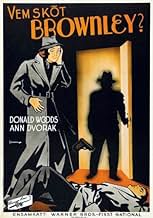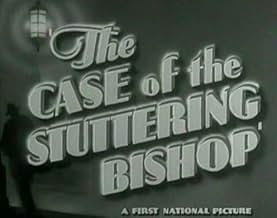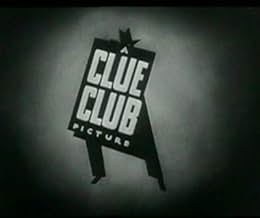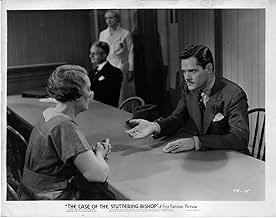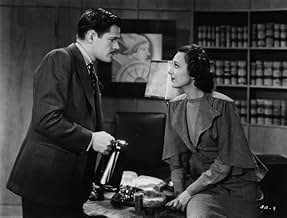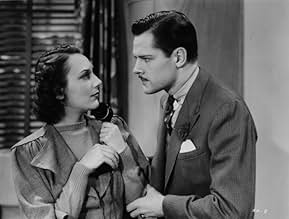Füge eine Handlung in deiner Sprache hinzuAn improbable stuttering bishop from Australia asks for Perry Mason's help in proving the identity of the legitimate heir to a millionaire.An improbable stuttering bishop from Australia asks for Perry Mason's help in proving the identity of the legitimate heir to a millionaire.An improbable stuttering bishop from Australia asks for Perry Mason's help in proving the identity of the legitimate heir to a millionaire.
- Regie
- Drehbuch
- Hauptbesetzung
Helen MacKellar
- Stella Kenwood
- (as Helen McKellar)
Charles C. Wilson
- Hamilton Burger
- (as Charles Wilson)
Eddy Chandler
- Detective James Fleet
- (Nicht genannt)
Empfohlene Bewertungen
We had two great evolutionary paths in the 30s. One was an amazing diversity of invention to settle some basic narrative devices that have since served us well as the basic vocabulary of cinema. The other, parallel path was the pulp detective novel, a master of which was Gardner.
The traditional, Holmes form is that you are linked to the detective. You discover what he does. Christie followed this form, but it is difficult to render in film. Gardner may be the first case — since common — of the novel adopting cinematic form. His formula does seem friendly to film: we see events that Mason does not, often before he gets seriously engaged. These events give us a false impression of what happened, so we as viewers start out with a deficit.
Then we have the detection; Mason and company are detectives in act two. The third act is always a courtroom, which is why our detective has to be a lawyer. Courtroom conventions have their own evolution in film, and this instance is limited to what in Christie's stories has to be a contrived assembly of the suspects.
This format allows for more complicated mysteries than were usual in film. My own preference for 30's detection is Philo Vance because the formula was not so strict. But this is a good one in terms of allowing complexity and surprise. We have that here in this solid instance.
One of the decisions in defining the characters is how intimate to make the relationship between alpha male Mason and his pretty and competent secretary. Why this matters has to do, as Mason would say, with motive. We like the guy. He is smart, as smart as other detectives, but why he does what he does
In some renderings of the Mason format, he just likes to win. He has his own Lestrade who he likes humiliating. Justice is incidental, and truth merely a tactic. He just like to strut.
In other renderings, he does what he does because he loves his team, his closest friend Drake and his lover Della. Both are profoundly loyal and true. He struts for her and we imagine passion after the obligatory Italian restaurant scene.
Here, a delicate balance between the two is maintained.
The traditional, Holmes form is that you are linked to the detective. You discover what he does. Christie followed this form, but it is difficult to render in film. Gardner may be the first case — since common — of the novel adopting cinematic form. His formula does seem friendly to film: we see events that Mason does not, often before he gets seriously engaged. These events give us a false impression of what happened, so we as viewers start out with a deficit.
Then we have the detection; Mason and company are detectives in act two. The third act is always a courtroom, which is why our detective has to be a lawyer. Courtroom conventions have their own evolution in film, and this instance is limited to what in Christie's stories has to be a contrived assembly of the suspects.
This format allows for more complicated mysteries than were usual in film. My own preference for 30's detection is Philo Vance because the formula was not so strict. But this is a good one in terms of allowing complexity and surprise. We have that here in this solid instance.
One of the decisions in defining the characters is how intimate to make the relationship between alpha male Mason and his pretty and competent secretary. Why this matters has to do, as Mason would say, with motive. We like the guy. He is smart, as smart as other detectives, but why he does what he does
In some renderings of the Mason format, he just likes to win. He has his own Lestrade who he likes humiliating. Justice is incidental, and truth merely a tactic. He just like to strut.
In other renderings, he does what he does because he loves his team, his closest friend Drake and his lover Della. Both are profoundly loyal and true. He struts for her and we imagine passion after the obligatory Italian restaurant scene.
Here, a delicate balance between the two is maintained.
Most of Edward McWade's roles were uncredited, but he certainly paid his dues in film-making; he had been making movies since 1919. Here he plays the stuttering bishop, who shows up at the office of Perry Mason (Donald Woods this time... Warren William had been playing Perry Mason for most of the 1930s.) with a case, then disappears. He makes accusations against the local rich man, Renald Brownley, played by Douglas Wood. Anne Dvorak and Joseph Crehan in supporting roles, as Mason confronts Brownley and tries to sort out the clues and what's going on. People start turning up dead, people are fighting, and then we're in the courtroom, like any good episode of Perry Mason. There are some comical moments, mostly between Mason and Della Street, and the names are a little confusing, with a Della, a Stella, TWO girls named Janice, and even an Ida. It's solid enough, with the usual court-room drama and outbursts. Directed by William Clemens, who had also directed many of the Nancy Drew and The Falcon films.
Donald Woods takes over the role of Perry Mason in the last of the Mason series that Warner Brothers did in the 30s with Ann Dvorak as Della Street in
The Case Of The Stuttering Bishop. Erle Stanley Gardner's lawyer/sleuth
would have to wait for television and Raymond Burr for its next incarnation.
Edward McWade, a bishop who stutters comes from Australia to see Woods about a possible fraud being perpetrated on millionaire Gordon Oliver regarding a fake granddaughter being foisted upon him. Later on Myra McKinney, Oliver's estranged daughter-in-law is arrested and it's Perry Mason for the defense.
Hamilton Burger played by Charles Wilson and Joseph Crehan as Paul Drake also appear. Burger for his one and only time in the movie series and Drake is a more traditional private eye. Previously Drake was "Spudsy Drake" played for comic relief by Allen Jenkins in previous films.
Viewers of the classic TV series will note that this observes the Perry Mason paradigm about never having guilty clients and the killer being unmasked in court. Previous films strayed from that somewhat.
I have to mention Tom Kennedy who took a leave from the Torchy Blaine series and brought his usual thick as a brick detective character with him. He's a favorite so incredibly droll and so naive.
Watch it for Tom Kennedy alone.
Edward McWade, a bishop who stutters comes from Australia to see Woods about a possible fraud being perpetrated on millionaire Gordon Oliver regarding a fake granddaughter being foisted upon him. Later on Myra McKinney, Oliver's estranged daughter-in-law is arrested and it's Perry Mason for the defense.
Hamilton Burger played by Charles Wilson and Joseph Crehan as Paul Drake also appear. Burger for his one and only time in the movie series and Drake is a more traditional private eye. Previously Drake was "Spudsy Drake" played for comic relief by Allen Jenkins in previous films.
Viewers of the classic TV series will note that this observes the Perry Mason paradigm about never having guilty clients and the killer being unmasked in court. Previous films strayed from that somewhat.
I have to mention Tom Kennedy who took a leave from the Torchy Blaine series and brought his usual thick as a brick detective character with him. He's a favorite so incredibly droll and so naive.
Watch it for Tom Kennedy alone.
Maybe you can keep up with the plot convolutions better than I could. Finally I lost track of the yellow or pink or white raincoats and threw in the towel. Anyway, it's a mildly entertaining Mason entry, at best. As a matter of fact, it looks to me like Warner Bros. had lost interest in the series—(for example, compare the sparse production values here with the richly produced The Case of the Curious Bride {1935}). This was the last installment and features a boyish Donald Woods as the legal wizard and sleuth. Frankly, in my book, he lacks the forceful presence required to bring off the role in authoritative fashion, and was, perhaps, a last minute replacement for the more familiar Warren William. Ironically, it's this installment that more closely resembles the TV show with its first-part dramatic setup and second-part courtroom pyrotechnics. Too bad the exotic Ann Dvorak is largely wasted as a recessive Della Street— with her distinctive looks and lively personality, she should have been one of the suspects. All in all, the 70 minutes is for hardcore fans of the series and for fans of the perennially addled Tom Kennedy as the aptly named "Magooney".
Donald Woods and Ann Dvorak were fine as Perry Mason and his secretary, Della Street, but it took me a while to get used to not seeing Raymond Burr in the Mason role. The complicated plot involves two women named Janice who claim to be the heir to the fortune of Douglas Wood, and an Australian bishop who asks Mason to see Mira McKinney, who can prove which one is the real one. But Wood is killed going to the rendezvous with McKinney, who is charged with murder. In customary Perry Mason style, there is a final courtroom scene (in this case only a hearing) where Mason flushes out the killer and the phony Janice. I enjoyed trying to follow the plot and the comedy that was prevalent. Tom Kennedy suddenly remembers an important item when he hears the name "Sampson," because it involves a ship called "Delilah." Woods always asking Dvorak to remind him to give her a raise when she gets a good idea (a running gag). Even the bishop, who explains he stutters only when under some emotional stress, provides some comedy at the end. He sheepishly stammers "g-g-goodness g-g-gracious" when three of the principal women kiss him goodbye.
Wusstest du schon
- WissenswertesAuthor Erle Stanley Gardner objected so vehemently to what he felt was the miscasting of Ricardo Cortez as Mason, that Warners replaced him with Donald Woods.
- PatzerNear the end, when Mason and his crew are having lunch during a court recess, Della drops her fork on her plate and reaches out across the table to break off some bread (after giving Mason the inadvertent hunch about Stella Kenwood). When the camera cuts back to Mason, Della has fork in hand again, but not the bread.
- Zitate
Perry Mason: [to Della] Bishops don't often need lawyers. Show him in.
- VerbindungenFeatured in Tote schlafen fest (1946)
- SoundtracksWhen Irish Eyes Are Smiling
(1912) (uncredited)
Music by Ernest Ball
Lyrics by Chauncey Olcott and George Graff
Sung a cappella with a phony Irish brogue by Donald Woods
Top-Auswahl
Melde dich zum Bewerten an und greife auf die Watchlist für personalisierte Empfehlungen zu.
Details
- Erscheinungsdatum
- Herkunftsland
- Sprache
- Auch bekannt als
- Clue Club #10: The Case of the Stuttering Bishop
- Drehorte
- Produktionsfirma
- Weitere beteiligte Unternehmen bei IMDbPro anzeigen
- Laufzeit1 Stunde 10 Minuten
- Farbe
- Sound-Mix
- Seitenverhältnis
- 1.37 : 1
Zu dieser Seite beitragen
Bearbeitung vorschlagen oder fehlenden Inhalt hinzufügen

Oberste Lücke
By what name was The Case of the Stuttering Bishop (1937) officially released in India in English?
Antwort
